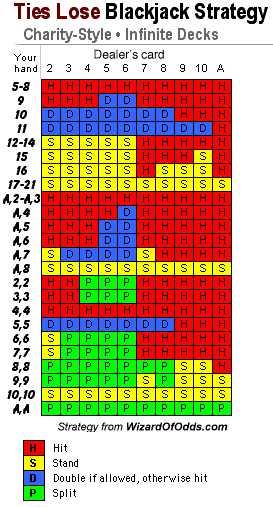Ask The Wizard #110
Are there any notable unresolved challenges that gaming mathematicians encounter? Much like a Fermat's Last Theorem for gambling, if you know of any, could you provide an example?
Good question. I can't think of any.
What fundamental approach should one use in 'charity blackjack' where ties favor the dealer?
Here's my take: I presumed the dealer stands on soft 17 and allows doubling after a split. To keep things straightforward, I considered an endless supply of decks. Any variations in strategy with 8 or fewer decks would be minimal. The house edge with infinite decks is calculated to be 9.36%.

What steps should someone take to launch a career as a gaming mathematician?
Most gaming mathematicians find employment with slot machine manufacturers. To break into this industry, my advice is to send out as many resumes as possible. Attending the Global Gaming Expo could also provide valuable insights into the business. If you're considering a self-employed path like mine, be prepared for a few years of hard work to establish a sustainable enterprise. Networking at gaming conventions could also be beneficial for business development.
Firstly, I must commend you on your impressive website; it serves as an excellent gaming resource. During my time in (omitted), I encountered a fascinating game that, unless I misinterpreted the rules or paytable, seems to offer returns exceeding 100%. However, it’s worth noting that it’s quite volatile. The game is titled 'Shockwave Poker', and it generally has a negative expectation on most hands.
Royal Flush 800
Straight Flush 100
Four of a Kind 50
Full House 10
Flush 7
Straight 5
Three of a Kind 3
Two Pair 1
Jacks or Better 1
I appreciate your compliment. Typically, the return in standard mode is 97.107%, while in Shockwave mode, it spikes to 287.6532%, according to Cindy Liu's Video Poker Calculator (which is currently offline). Ignoring the stipulation of one four of a kind per Shockwave Mode, the expected value for Shockwave Mode can be calculated as 10*(2.876532-1) = 18.76532. When this is added to the value of a four of a kind in the regular game, the expected return totals 101.43%.
In keno machines, does the RNG simply select the numbers for potential wins, or does it merely indicate win/loss outcomes while the displayed numbers serve no significant purpose?
In Nevada, and probably in other major gaming hubs across the United States, the drawn balls are indeed random, and the outcomes depend on these balls. However, in class II slots, often found in Indian casinos, the outcomes can vary widely.
I work as a dealer at a non-tribal casino here in beautiful Washington. I noticed some discussions ( April 4, 2004 column ) regarding tip sharing, and I felt compelled to contribute my thoughts. I work in a 'keep your own' environment and wouldn't change that for anything. Contrary to common stereotypes, I am not an attractive Asian female; I am a white male, and I enjoy my Friday nights off. While I don't always get the best tables, I still manage to earn over $900 a week in tips. The casino that originally trained me was tribal and involved sharing tips, which I found frustrating after three months. I prefer to keep what I earn; it ensures that I’m recognized for my own efforts. This also keeps me motivated as I need to maintain a positive attitude and ensure that I provide exceptional service, which benefits me, the establishment, and the players alike. I’m not interested in the pooled tip structures that boast rates of $50/hour; I will never share my tips again. I advise fellow dealers, especially those from underrepresented groups, to focus on delivering the best service possible each day. Don’t dwell on the money entering or leaving your tip box; sometimes you’ll get stiffed, but providing stellar service will ultimately lead to better returns when you cash out at the end of your shift.
I appreciate your feedback. I had a suspicion that the other dealer may have exaggerated the impact of race and gender on tipping.


